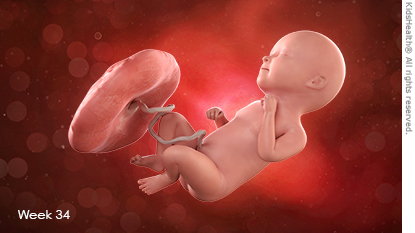- Home
- Humana Medicaid
- Kentucky Medicaid
- Medicaid extras
- Health and wellness
- Parents Home
- Para Padres
- A to Z Dictionary
- Allergy Center
- Asthma
- Cancer
- Diabetes
- Diseases & Conditions
- Doctors & Hospitals
- Emotions & Behavior
- First Aid & Safety
- Flu (Influenza)
- Food Allergies
- General Health
- Growth & Development
- Heart Health & Conditions
- Homework Help Center
- Infections
- Newborn Care
- Nutrition & Fitness
- Play & Learn
- Pregnancy Center
- Preventing Premature Birth
- Q&A
- School & Family Life
- Sports Medicine
- Teens Home
- Para Adolescentes
- Asthma
- Be Your Best Self
- Body & Skin Care
- Cancer
- Diabetes
- Diseases & Conditions
- Drugs & Alcohol
- Flu (Influenza)
- Homework Help
- Infections
- Managing Your Weight
- Medical Care 101
- Mental Health
- Nutrition & Fitness
- Q&A
- Safety & First Aid
- School, Jobs, & Friends
- Sexual Health
- Sports Medicine
- Stress & Coping
Pregnancy Calendar: Week 34
Your Baby's Development
Maternal calcium intake is very important during pregnancy. A developing baby draws calcium from the mother to make and harden bone. Because your growing baby's calcium demands are high, be sure you're getting enough of this mineral to prevent a loss of calcium from your own bones. Your prenatal vitamin has some extra calcium, but be sure to also eat calcium-rich foods like milk and other dairy products, tofu, broccoli, and calcium-fortified juices and foods.
By now most babies will be in position for delivery. Your health care provider can tell you if your baby is positioned head- or bottom-first. Babies born at 34 weeks usually have fairly well-developed lungs, and their average size of 5 pounds (2,250 grams) and 12.6 inches (32 cm) from crown to rump allows them to survive outside the womb without extensive medical intervention.

Your Body
 Being tired is a common complaint of late pregnancy. Difficulty sleeping, aches and pains, weight gain, and anxiety about labor, delivery, and taking care of a newborn may contribute to your exhaustion. Rest as much as you can and take naps if possible.
Being tired is a common complaint of late pregnancy. Difficulty sleeping, aches and pains, weight gain, and anxiety about labor, delivery, and taking care of a newborn may contribute to your exhaustion. Rest as much as you can and take naps if possible.

© 1995- The Nemours Foundation. KidsHealth® is a registered trademark of The Nemours Foundation. All rights reserved.
Images sourced by The Nemours Foundation and Getty Images.
